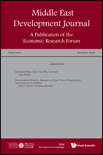
Middle East Development Journal
Scope & Guideline
Innovating Perspectives on Regional Growth and Policy
Introduction
Aims and Scopes
- Economic Development and Policy Analysis:
The journal emphasizes research that analyzes economic policies, labor market dynamics, and fiscal strategies, particularly in the context of MENA countries, aiming to understand the impact of these policies on development outcomes. - Social Issues and Human Capital:
A consistent focus on social dimensions, including education, employment, and health, the journal explores how these factors interact with economic policies and contribute to human capital development in the region. - Political Economy and Institutional Quality:
Research on the interplay between political risk, institutional quality, and economic outcomes forms a core area of focus, providing insights into how governance affects investment and development in MENA. - Impact of Global and Regional Shocks:
The journal investigates the effects of global phenomena, such as pandemics and economic sanctions, on MENA economies, emphasizing the need for resilience and adaptive strategies. - Gender and Labor Market Dynamics:
The journal also addresses gender disparities in employment and economic participation, highlighting the unique challenges faced by women in the labor market within MENA countries.
Trending and Emerging
- COVID-19 and Its Socioeconomic Impacts:
Research on the socioeconomic impacts of COVID-19 has surged, highlighting how the pandemic has affected labor markets, health systems, and economic policies in the MENA region, reflecting the urgency of understanding these dynamics. - Labor Market Transitions and Employment Dynamics:
There is an increasing focus on labor market transitions, particularly in the context of post-Arab Spring developments, exploring how political and social changes are reshaping employment opportunities and challenges. - Financial Systems and Economic Resilience:
Emerging themes around the resilience of financial systems, including the impact of sanctions and asset quality on lending, showcase a growing interest in how financial stability influences broader economic development. - Gender Inequality and Employment:
A notable trend is the heightened emphasis on gender issues, particularly women's employment and economic participation, reflecting a broader global dialogue on gender equality and its implications for development. - Technological Innovations and Economic Growth:
The exploration of fintech and technological advancements in the region indicates a growing recognition of the role of technology in driving economic growth and addressing developmental challenges.
Declining or Waning
- Historical Economic Analysis:
There has been a noticeable decrease in the publication of papers focusing on historical economic analyses and comparisons, such as those examining economic conditions during the Ottoman Empire or earlier periods, suggesting a shift towards more contemporary issues. - Macroeconomic Stability and Growth Models:
Research specifically dedicated to traditional macroeconomic stability and growth models has waned, possibly due to the growing complexity of economic issues that require more nuanced approaches beyond classical models. - Environmental Economics:
The focus on environmental economics, particularly in relation to natural resource management and climate change, appears to be less prominent in recent publications, indicating a potential area that may need revitalization.
Similar Journals
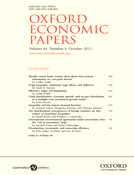
OXFORD ECONOMIC PAPERS-NEW SERIES
Illuminating trends and policies with scholarly precision.OXFORD ECONOMIC PAPERS-NEW SERIES is a prestigious academic journal published by Oxford University Press, dedicated to advancing the field of economics and econometrics. With an ISSN of 0030-7653 and an E-ISSN of 1464-3812, this journal has a rich history since its inception in 1938, and continues to play a vital role in disseminating impactful research through its convergence of years spanning from 1938 to 2024. Recognized as a Q2 journal in the 2023 category of Economics and Econometrics, it ranks #396 among 716 in its field according to Scopus, reflecting a commendable position within the academic community, particularly in global economic discussions. While the journal currently does not offer open access options, it remains committed to providing a platform for rigorous research and critical discourse. Researchers, professionals, and students will find the journal's articles to be essential reading, offering insights that are pivotal for understanding economic trends, policies, and methodologies. Its focus on high-quality scholarship ensures that contributions are both theoretically robust and practically relevant, making it a significant resource in the ever-evolving landscape of economic research.

CAMBRIDGE JOURNAL OF ECONOMICS
Navigating the Complexities of Economic ThoughtCambridge Journal of Economics, published by Oxford University Press, is a premier academic journal in the field of economic theory, policy, and applications, catering to researchers, professionals, and students alike. With a rich history dating back to 1977, this journal has established itself as a notable contributor to critical discourse in the arena of Economics and Econometrics. With an impressive Scopus ranking of #210 out of 716 in its category, placing it in the 70th percentile, the journal maintains a solid Q2 classification, reflecting its significant impact and contribution to the field. Although it operates on a subscription basis, the Cambridge Journal of Economics is accessible through a range of academic databases and libraries, ensuring that its high-quality research reaches a wide audience. The journal aims to advance the understanding and application of economic principles, making it an essential resource for anyone looking to deepen their knowledge or stay updated with the latest research trends in economics.
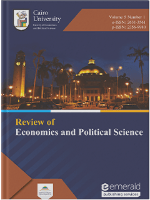
Review of Economics and Political Science
Connecting scholars and practitioners for impactful solutions.Review of Economics and Political Science, an esteemed publication by EMERALD GROUP PUBLISHING LTD, stands at the forefront of interdisciplinary research, exploring the intricate relationships between economics, political science, and societal dynamics. Since its transition to an Open Access format in 2018, the journal has provided global accessibility to cutting-edge research, fostering a rich dialogue among scholars and practitioners in the fields of Applied Mathematics, Econometrics, and Political Science. With a commendable Q2 ranking in multiple categories including Economics and Political Science, the journal offers a robust platform for high-impact studies that drive innovation and policy development. Located in the United Kingdom, it caters to an international audience and actively contributes to the academic discourse, as evidenced by its solid performance in Scopus rankings. Researchers, professionals, and students alike will find invaluable insights within its pages, making it a vital resource for understanding contemporary economic and political challenges.
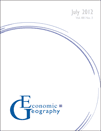
ECONOMIC GEOGRAPHY
Illuminating the Links between Place and ProsperityECONOMIC GEOGRAPHY, published by Taylor & Francis Ltd, is a premier journal in the fields of Economics and Geography, acclaimed for its rigorous exploration of the spatial dynamics of economic processes. With an ISSN of 0013-0095 and E-ISSN of 1944-8287, this journal boasts a remarkable standing reflected in its 2023 Q1 category rankings in both Economics and Econometrics and Geography, Planning and Development. Positioned within the top percentile of its categories in Scopus rankings, it is a vital resource for researchers, professionals, and students seeking to understand the complex interplay between economic activities and geographical contexts. Published in the United Kingdom, the journal maintains a rich archive dating back to its inception in 1972, making it a significant repository of knowledge for those examining economic geography across decades. While not an open-access journal, its in-depth articles provide crucial insights into pressing economic issues and contribute to advancing scholarly discourse in the discipline.
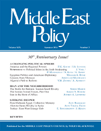
MIDDLE EAST POLICY
Advancing Scholarly Insights on Regional PoliciesMIDDLE EAST POLICY stands as a notable journal in the fields of Political Science and International Relations, published by Wiley in the United Kingdom. With a rich publication history dating back to 1992, this journal provides a critical platform for scholarly exploration and dialogue surrounding Middle Eastern political dynamics and policies. It ranks in the Q3 category in the 2023 evaluations for both Political Science and International Relations and Sociology, indicating its influential role in these academic fields. While it does not offer open access, it is recognized for its rigorous peer-reviewed articles that contribute valuable insights and analyses on pressing regional challenges and institutional frameworks. Researchers, professionals, and students engaged in Middle Eastern studies will find MIDDLE EAST POLICY essential for understanding the complex socio-political landscapes of the region and for fostering informed discussions that advance both scholarship and practice.
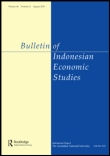
BULLETIN OF INDONESIAN ECONOMIC STUDIES
Advancing Insights into Indonesia's Economic LandscapeBULLETIN OF INDONESIAN ECONOMIC STUDIES (ISSN: 0007-4918; E-ISSN: 1472-7234) is an esteemed journal published by Routledge Journals, Taylor & Francis Ltd, based in the United Kingdom. Since its inception in 1965, this journal has played a pivotal role in advancing the understanding of economic development within Indonesia and the wider Southeast Asian region. With an impressive impact, it holds a Q1 ranking in both Development and Economics and Econometrics categories for 2023, reflecting its influential contributions to the field. The journal is highly regarded for featuring empirical research, theoretical analyses, and policy discussions, consistently ranking among the top publications in social sciences and economics—placing it in the 92nd and 90th percentiles respectively. As a vital resource for researchers, professionals, and students, the BULLETIN OF INDONESIAN ECONOMIC STUDIES provides invaluable insights into economic issues, making it essential for those aiming to grasp the complexities of economic systems in Indonesia and beyond.
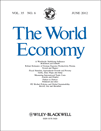
WORLD ECONOMY
Unveiling critical research for a better financial future.WORLD ECONOMY is a premier academic journal published by Wiley, renowned for its rigorous peer-reviewed research in the fields of economics, finance, accounting, and political science. Established in 1977, the journal has consistently contributed to the advancement of knowledge, reflected in its strong standing across various category quartiles, notably achieving Q1 in Accounting and Political Science, and ranking in the top quartile in its respective disciplines as of 2023. With an audience that spans researchers, professionals, and students, WORLD ECONOMY publishes impactful articles that explore critical issues affecting the global economy. Although it is not an open-access publication, readers have access options to engage with cutting-edge research that addresses both theoretical and practical aspects of world economic trends. The journal's commitment to excellence is further underscored by its impressive Scopus rankings, situating it among the top journals in the social sciences arena. For anyone keen on deepening their understanding of the dynamics shaping our economic landscape, WORLD ECONOMY remains an indispensable resource.
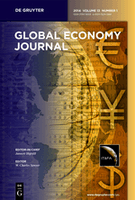
Global Economy Journal
Connecting research with real-world economic challenges.Global Economy Journal, published by World Scientific Publishing Co Pte Ltd, is an authoritative platform dedicated to advancing research in the fields of economics, econometrics, and finance. Established in 2006 and operating from Singapore, this journal aspires to address comprehensive topics that shape both global and local economic landscapes, making significant contributions to academic discourse and policy-making. With an ISSN of 2194-5659 and an E-ISSN of 1553-5304, the journal is recognized for its rigorous peer-review process and is currently ranked in the Q3 quartile of economics journals as of 2023, placing it within the top half of scholarly publications in the field. The Scopus ranking positions it at #132 out of 288, showcasing its growing influence among researchers and professionals alike, embodying a percentile of 54. Although it does not offer open access, the journal plays a pivotal role in disseminating cutting-edge research, fostering a profound understanding of economic trends, challenges, and innovations that impact societies worldwide. Researchers, professionals, and students are encouraged to engage with the latest findings and discussions published in the Global Economy Journal to stay at the forefront of economic thought and practice.
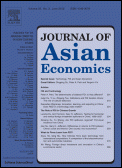
Journal of Asian Economics
Illuminating Economic Trends Across AsiaThe Journal of Asian Economics, published by Elsevier, serves as a pivotal platform for scholars and practitioners engaged in the comprehensive study of economic issues within Asia. With an ISSN of 1049-0078 and an E-ISSN of 1873-7927, this esteemed journal encompasses a wide array of topics in its scope, ranging from macroeconomic policy analysis to the intricacies of financial markets in the Asian context. Ranking in the Q2 category for both Economics and Econometrics and Finance, according to the 2023 metrics, it is positioned among the top-tier journals, currently holding a significant place at the 73rd percentile in Finance and 72nd percentile in Economics. This journal not only caters to academic researchers looking to publish their findings but also serves as an essential resource for professionals and students seeking to deepen their understanding of the dynamic economic landscape in Asia. By bridging empirical research and practical insights, the Journal of Asian Economics plays a crucial role in advancing knowledge and encouraging discourse in the field.
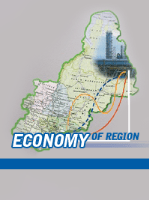
Economy of Region
Exploring the Intersections of Economy, Business, and EnvironmentEconomy of Region is a distinguished peer-reviewed journal dedicated to advancing research and discourse in the fields of economics, business management, and environmental science. Published by the Russian Academy of Sciences, Ural Branch, Institute of Economics, this open-access journal has been expanding its reach since 2005, offering invaluable insights and fostering academic collaboration on both a national and international scale. With an impressive blend of research focus areas, it has secured notable rankings, including Q2 in Economics and Q3 in Business and Environmental Science for 2023, reflecting its commitment to quality and impact within these domains. Economy of Region presents a critical platform for scholars, professionals, and students to engage with contemporary economic issues while contributing to the ongoing development of pertinent knowledge in the field. Researchers are encouraged to submit original works that explore intricate economic landscapes, thereby enhancing the journal's contribution to academia and practice.